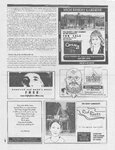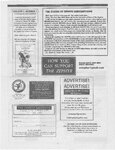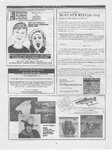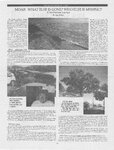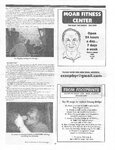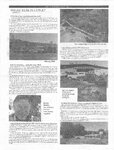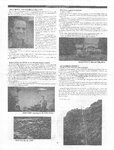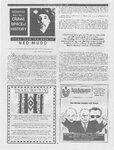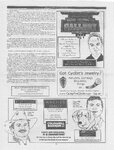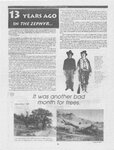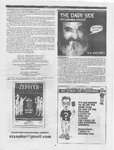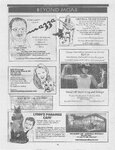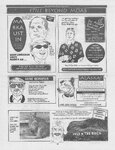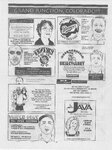| OCR Text |
Show "HY R/ JUNE-JULY 2008 1 ema cyte IN THE ZEPHYR... The June/July issue of The Zephyr included a cover story on wilderness. In it I discussed the idea that some “environmentalists” supported wilderness for purely economic reasons. 13 years ago, I believed that those kinds of ‘enviropreneurs’ were few and far between. Iwas wrong...JS But how much do we save? Most rural counties don’t want to save any, and some county governments have been that blunt about it. Others have identified token parcels of wilderness just to be able to say they made an effort. At many of the county wilderness hearings, opponents of wilderness vociferously fought the designation of lands they had never even seen..land they had long ago deemed useless because of its lack of economic value. Yet they still opposed wilderness simply because the “feds” were imposing more rules and regulations and interfering with their lives, And that is what much of the wilderness opposition is about. Years ago in an interview with then county commissioner David Knutson, my always candid friend observed that we pretty much know where all the gas and oil and exploitable minerals are, Most of those areas, which constitute 75% of the state's public lands aren’t even ‘being considered for wilderness. But what if they were. Does the possibility of making a buck off an acre , of land always take precedent over other qualities and values the land might possess? Does its sheer beauty and grandeur mean nothing if we can pump a few barrels of oil from beneath it? There was a time in the history of this state when the exploitation of its mineral wealth was condemned by political and religious leaders. The threat of such exploitation caused Brigham Young to thunder to his people, “Gold is for paving streets. The business of a Saint is to stay home and make his fields green." And Mormon leader Orson F. Whitney echoed Young’s sentiments when he proclaimed, "Who wishes to see Deseret, peaceful Deseret, turned into a rollicking mining camp? Not the Latter day Saints!" mong those who oppose and even fear wilderness designation, there is one concern with which | completely share. In a recent letter to the Deseret News, Moab resident Lilly Mae concern for another threat to the wildlands af thern: Utah: ional: exploitation; in Ms. Noorlander’s mind, -is as destructive as any cow or miner could ever hope to be. “Long-forgotten ranches,” Noorlander observes, “abandoned decades ago by the lonely miner or driller,are now front page fare in the poor marketing pieces of this lucrative industry...Some of thedirect f their p ional activities, aside from generating profit from calendars, hiking exposes and membership dues include: more foot trails, bike trails, garbage, human waste, instructional signs, regulations, law enforcement patrols, costs to local government for crowd control, and a general loss of peace and serenity to the plaid clad, waffle stomper crowd. "The spirit of wilderness,” concludes Lilly Mae, "has already been stolen by those who profess to be its savior, but who have, in fact, trampled the life out its essential serenity and solitude in an orgy of self-indulgence.” Strong words and | agree with almost all of them. Unfortunately, she assumes that all environmentalists are guilty of this kind of behavior, the same way many of us condemn all ranchers for the damage cattle can cause to this fragile desert of ours. We all constitute a threat to wilderness, as any of us who just survived another Easter Weekend and tens of thousands of recreationists know. That's why, if | had my way with wilderness, | would protect it in ways that would avoid even the possibility of commercial exploitation, I would prohibit any outfitter or guide company from leading tours through wilderness areas for profit. | would eliminate the possibility of allowing rich doctors and lawyers from Denver or San Francisco to set up guided trips for themselves at several hundred dollars a day, to be led by the hand all day and fed gourmet food in the evening, because they don’t have the time or the energy or the inclination to see wild country any other way. This is not the place for “soft adventure,” a nauseating ce some river companies now use to describe their guided trips down the Colorado ver. And if wilderness lands began to show signs of impact from overuse, I] would support the idea of closing such areas to everyone. Is this putting more power into the hands of the "feds?" Maybe. But no one could possibly say they were favoring one special interest group over another. Dave Foreman once suggested we allow wilderness areas to literally become blank spots on the map..NO DAMN GUIDE BOOKS. Let them become places of mystery and adventure. Make it clear to everyone who chooses to explore the wilderness that they enter at their own risk. That they will not be rescued if they turn an ankle or break a leg. No one will bring them water if they fail to carry enough with them. We enter the wilderness and we leave our cellular phones at the boundary. Boe we had |




